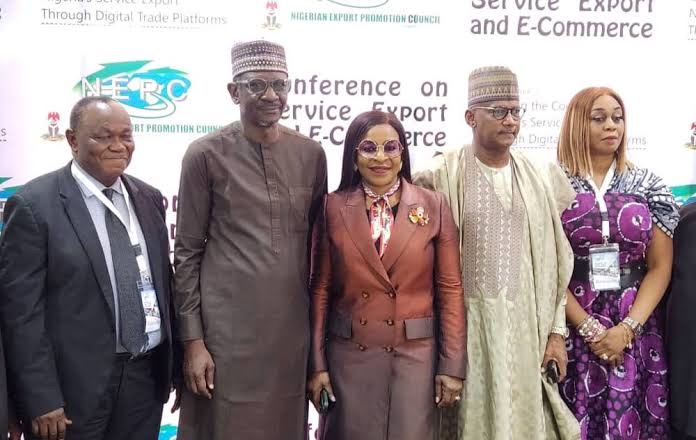The Federal Government of Nigeria has reiterated its commitment to advancing the country’s export service sector through the utilization of digital platforms as a means to stimulate and boost the nation’s economy.
This declaration was made by Doris Uzoka-Anite, the Minister of Industry, Trade, and Investment, during a key conference on service exports organized by the Nigerian Export Promotion Council (NEPC) on Tuesday in Abuja.
The event drew a diverse group of participants, including prominent stakeholders from both the oil and non-oil sectors, industry captains, bankers, and key economic players. The conference, which centered on the theme, ‘Charting the Course for Nigeria’s Service Export through Digital Trade Platforms,’ provided a crucial platform for discussions on how digital tools can enhance Nigeria’s position in the global trade arena.
In her remarks, Ms. Uzoka-Anite, represented by Nura Rimi, the permanent secretary of the Ministry of Industry, Trade, and Investment, emphasized that the forum was a vital step toward unlocking the full potential of Nigeria’s service export industry. She pointed out the growing importance of services and e-commerce in the ever-changing global trade environment, noting how central these sectors have become to fostering economic growth across nations.
According to the minister, “the service sector, in particular, has emerged as a powerful engine for innovation, job creation, and economic diversification,” highlighting Nigeria’s vast and untapped talent pool. She added that Nigeria, blessed with rich human capital, must not be left behind in the race to harness the benefits of the rapidly growing service export market.

Ms. Uzoka-Anite underlined the transformative impact of digital platforms on global trade and how they have revolutionized business practices worldwide. She explained that “Central to today’s discussion is the transformative power of digital platforms in global trade. These platforms have revolutionized the way businesses connect, providing vast opportunities for service providers to expand internationally.”
She further stressed the government’s commitment to creating a favorable environment that would support this vision, adding that digital trade and e-commerce are key pillars of the country’s economic agenda. The government, she assured, would continue to place a high premium on these areas to ensure that they serve as the driving force behind the growth of Nigeria’s service sector.
“The federal government is committed to creating an enabling environment for the vision. Our economic agenda places digital trade and e-commerce at the core of our service sector strategy,” the minister said.
Ms. Uzoka-Anite also noted that the rise of digital trade platforms has successfully dismantled traditional trade barriers, thus facilitating cross-border transactions and promoting greater inclusiveness for Nigerian service providers, particularly small and medium enterprises (SMEs).
She highlighted the importance of this development, explaining that SMEs, which form the backbone of Nigeria’s economy, now have increased opportunities to engage with global markets and improve their competitive standing.
Furthermore, the minister expressed optimism about the federal government’s initiative to develop a digital platform specifically designed to boost Nigeria’s service exports. She described this move as timely and strategic, and one that would play a significant role in the country’s economic diversification efforts.
“Through sustained growth and development, this platform will not only provide viable market access opportunities but also structure efforts to mainstream women and the skilled, talented youth populace into the global economy,” she said.

By doing so, the platform will not only enhance the service sector but also make considerable contributions to the broader economy by promoting the inclusion of underrepresented groups such as women and youth.
Ms. Uzoka-Anite concluded by affirming that the implementation of this platform would support Nigeria’s ambition to diversify its economy away from oil dependence. She expressed confidence that it would open up new growth opportunities in the service sector, enabling Nigeria to thrive in the digital age and contribute meaningfully to global trade.
In her earlier remarks, Nonye Ayeni, the Executive Director of the NEPC, reiterated the importance of promoting service exports as a crucial element of Nigeria’s broader export strategy. She explained that the NEPC is mandated to promote the development and diversification of the country’s non-oil exports and that the service sector represents a significant but underutilized opportunity in this regard.
Ms. Ayeni emphasized that there are numerous untapped services in Nigeria, and the focus of the conference was to address some of these areas, thereby fostering further economic growth. She expressed hope that the discussions and recommendations emerging from the event would contribute positively to Nigeria’s ongoing efforts to advance its economy through service exports.
Also contributing to the discussion, the Managing Director of the Oil and Gas Free Zone Authority, Bamaga Usman, represented by Cynthia Egurudu, commended the NEPC for organizing the conference. He praised the council’s forward-thinking approach to exploring new ways of boosting Nigeria’s economy, particularly through the promotion of service exports.
Overall, the conference underscored the Federal Government’s determination to leverage digital platforms as a key driver in expanding Nigeria’s service export sector. Through collaborative efforts between the government, industry stakeholders, and digital trade experts, the country aims to build a robust framework that will enable Nigerian businesses, especially SMEs, to thrive in the global marketplace. By embracing digital innovation, Nigeria is poised to unlock the full potential of its service sector, positioning itself as a major player in international trade.

































